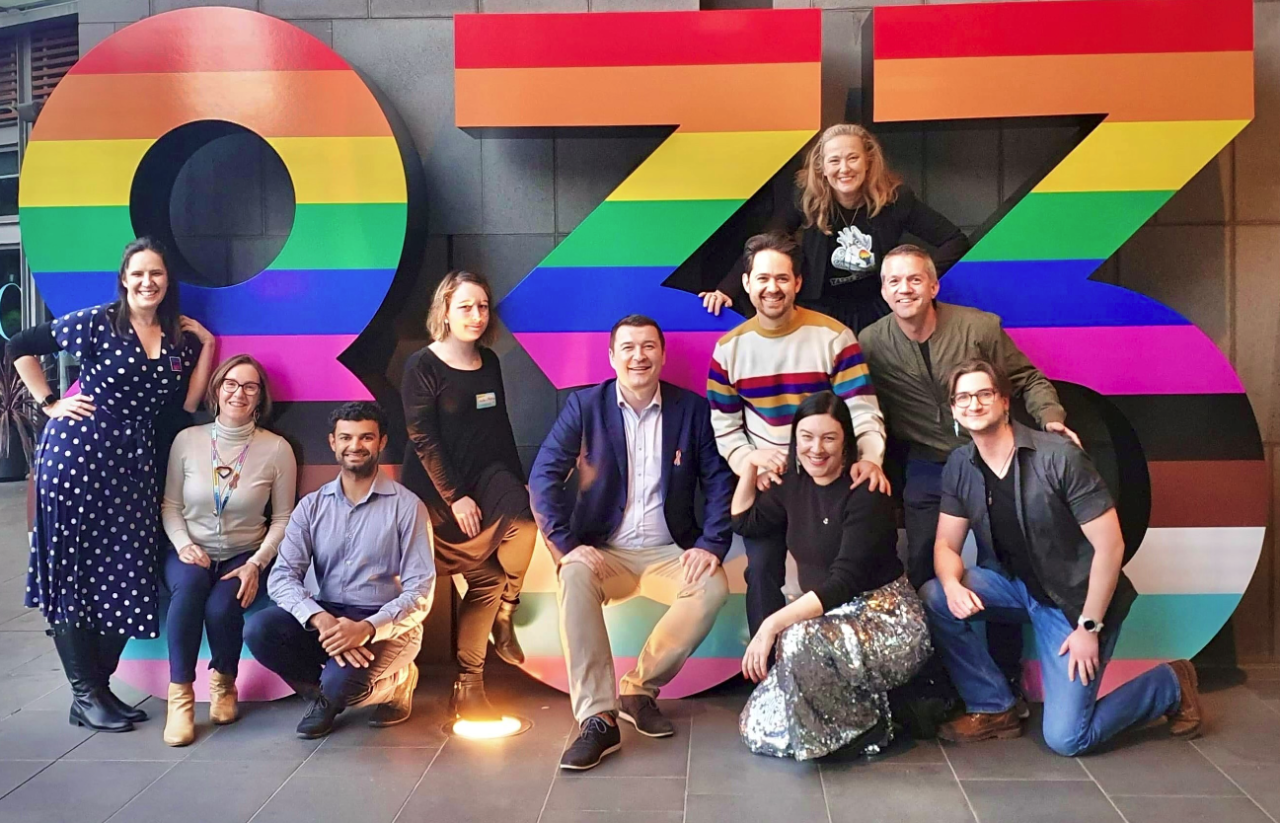Inside ANZ
Inclusive banking services is a basic human right
Terminology can have a profound impact on a person’s identity, self-worth, and inherent dignity. The use of inclusive and acceptable terminology empowers individuals and enables visibility of important issues – Australian Human Rights Commission.

Some members of ANZ's Pride Network
Despite non-binary being a legally recognised gender across Australia, people who don’t identify as exclusively men or women often find they are not represented in basic services such as utilities or banking. Instead they are forced to choose between binary options that do not match their gender identity.
This erasure and discrimination of non-binary identities can impact non-binary people’s ability to participate in the economy and society.
Meaningful change comes from the inside
Since 2014, ANZ’s LGBTIQ+ network has been championing the need for banking systems to be more inclusive of non-binary people. And while there wasn’t necessarily a formal business case to proceed, we knew it was the right thing to do to ensure all customers have access to relevant options when selecting gender titles.
To many people, updating a couple of drop-down boxes sounds like a seemingly simple task when in fact this change has been nearly eight years in the making and required updates to the bank’s core system. Banking systems – in fact systems right through society – were simply never designed with broader choices in mind.
This year ANZ introduced the ability for Australian customers to choose the gender option of non-binary and the gender-neutral title of Mx (pronounced “miks”) when applying for certain ANZ products.
Non-binary is both an umbrella term used by people whose gender identities do not conform to the binary approach to gender (only men or women) and is also a gender identity in its own right. People who identify as non-binary may regard themselves as neither a man nor a woman.
Mx (pronounced “miks”) is a gender-neutral salutation option and is used in the same way as Miss, Mrs, Ms or Mr, etc.
ANZ’s recognition of non-binary gender and the commonly used gender-neutral title of Mx is bigger than just a technology change; it is supported through ongoing staff awareness, demonstrates the power of inclusive language and will encourage a greater understanding of gender and gender identity.
A change of this magnitude requires support from almost all areas of the organisation and during the process we were challenged to think outside the box to deliver great solutions for our customers and the community.
Hundreds of people across ANZ worked on this initiative – and every single person has been in full support of it.
At the heart of the change is a focus on customer experience, ensuring non-binary people have a seamless experience choosing gender-neutral options when applying for ANZ products as well as their ongoing banking needs.
Across virtually every division in the bank, teams from technology, risk, digital, product and the frontline worked on countless system changes, collateral updates, banker process enhancements and data and risk assessments. We truly believe this is how an organisation which supports LGBTIQ+ inclusion walks the talk.

Access to basic services such as banking is a human right, but how would it affect your sense of self if your identity was not recognised by the organisations that provide these services? This is often the common experience for non-binary and gender diverse people.
Leading by example
We’re proud ANZ has become one of the first banks in the world to offer our customers non-binary gender and gender-neutral title options.
It’s a clear example of the great things that can be achieved when an organisation encourages people to own the company’s purpose and collaborate to place the customer at the centre of every decision so meaningful change can be achieved.
Implementing something like this isn’t easy. From the start we made a commitment to prioritise a positive end-to-end experience for our non-binary customers, resulting in several tough calls being made throughout the implementation and requests to technology and change partners to pivot with little notice.
Though not simple, the process was a testament to creating shared clarity around the value ANZ strives to achieve for our customers and the journey we’ve been on over many years.
We hope, like ANZ, other organisations who want to support the inclusion of non-binary and gender diverse people will connect their LGBTIQ+ networks with technology, digital and customer experience experts to begin the journey of implementing meaningful system changes.
By taking the lead for this change in the Australian banking industry, ANZ continues to publicly demonstrate our support of the LGBTIQ+ community efforts to improve inclusion and remove barriers in the access of services for trans and gender diverse people.
ANZ will announce the new non-binary and Mx title options to customers ahead of International Non-Binary People’s Day on 14 July.
Darren Baird (he/him) is the Digital Portfolio Lead and sponsor of the Mx & Non-Binary customer initiative;
Caitlin Monnery-Korving (she/her) is a Banker Digital Experience Expert and Pride Co-Lead; and
Dave Beks (he/him) is a Business Architect and Pride Senior Leader
Related Articles:
NZ Media Releases
ANZ introduces six weeks’ paid gender affirmation leave
Inside ANZ
